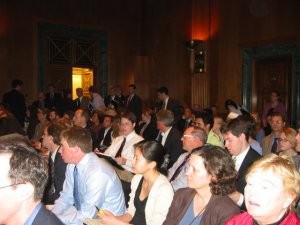Close to 150 Congressional staffers, policy types and lobbyists jammed a Senate hearing room yesterday for a briefing on carbon taxes and cap-and-trade systems featuring CTC’s Charles Komanoff, along with Terry Dinan of the Congressional Budget Office and James Barrett of Redefining Progress.
 The briefing was sponsored by the Environmental and Energy Study Institute. Attendance at EESI briefings generally runs between 75 to 100, and the packed house for the March 14 panel was taken as a sign of surging interest in carbon pricing.
The briefing was sponsored by the Environmental and Energy Study Institute. Attendance at EESI briefings generally runs between 75 to 100, and the packed house for the March 14 panel was taken as a sign of surging interest in carbon pricing.
Charles’s presentation may be accessed here. It’s an updated and more concise version of the PowerPoint on our Home Page.

 The bottom line: peak oil will come some day, but not soon enough to avert climate catastrophe. I’ve long maintained that "peak oil" wouldn’t be a climate lifesaver. In my first talk centered on carbon taxing, at the "Philly Beyond Oil" meeting in 2005, I noted that $70 crude would "stimulate conservation, extraction and substitution," and that only the first of this trio (conservation) would be a climate-helper. Quoting the trenchant economics writer
The bottom line: peak oil will come some day, but not soon enough to avert climate catastrophe. I’ve long maintained that "peak oil" wouldn’t be a climate lifesaver. In my first talk centered on carbon taxing, at the "Philly Beyond Oil" meeting in 2005, I noted that $70 crude would "stimulate conservation, extraction and substitution," and that only the first of this trio (conservation) would be a climate-helper. Quoting the trenchant economics writer  These thoughts came to mind when we read an
These thoughts came to mind when we read an